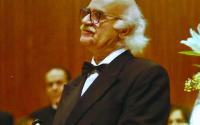28 December 2004
Susan Sontag's perceptive, often controversial, thoughts continually challenged all those who read them, and made a hugely important contribution to recent American thought.
As the high priestess of the American avant-garde, Susan Sontag rejected traditional notions of artistic criticism.
But, more recently, she tempered her radicalism and produced her first romantic novel, The Volcano Lover, at the age of 60.
Defender of pornography
Born Susan Rosenblatt in New York in 1933, Sontag rarely saw her parents, who lived in China, and was instead raised by relatives in Arizona and California.
From Chicago, via Harvard to Oxford, Sontag enjoyed what she called "probably the best university education in the planet" and embarked on a series of incendiary essays. Writing for the Partisan Review and the New York Review of Books, her subjects ranged from defining camp, to defending pornography as a valid literary genre.
Though accused by some critics of "moral obtuseness" and a lack of humanity, her fearlessness and intellectual vigour won Sontag a large following.
Turned illness into words
After a 1968 visit to Vietnam, Sontag's work became increasingly political. She damned the United States for its involvement in Indochina, calling America "passionately racist" and "a doomed country...founded on genocide".
Central to Sontag's world-view was the idea that morality has no place in art or in art criticism. To this end, she initially praised Leni Riefenstahl's Nazi documentary films for their depiction of "intelligence, grace and sensuousness".
However, she later appeared to recognise that ideas do arise from forms and that those ideas could themselves be poisonous.
Following a diagnosis of apparently terminal breast cancer in 1976, Sontag wrote the seminal work Illness as Metaphor. Although treated successfully herself, Sontag used her experience to explore the language of popular disease.
Her work divided critics
She followed this, a decade later, with Aids and Its Metaphors, a reflection on Sontag's personal experience of the impact of HIV.
Her 1992 novel, The Volcano Lover, examined the triangular relationship between Horatio Nelson, Emma Hamilton and Emma's husband Sir William.
The best-selling work divided the critics. One called it "penetrating and insightful", another said it was "distanced and indolent".
More recently Sontag defended claims of plagiarism made against her novel, In America.
Sontag's formidable talent made her America's highest-profile "renaissance woman" and her library of 15,000 books is testament to both the breadth and depth of her thought.
Often outrageous and with a desire to shock, she possessed the unfailing ability to get under the skin of both the reactionary right and the self-satisfied liberal wing of America's opinion formers.
Beyond this, though, Susan Sontag will be remembered as a fearless thinker whose pronouncements on everything from sex to photography to language had a formative impact on not one, but four, generations.






